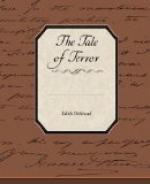are put to flight by a troop of aerial spirits.
Dr. Drake knew the Gothic stories of Walpole, Mrs.
Barbauld, Clara Reeve and Mrs. Radcliffe; and traces
of the influence of each may be found in his work.
Henry Fitzowen loves Adeline de Montfort, but has
a powerful and diabolical rival—Walleran—whose
character combines the most dangerous qualities of
Mrs. Radcliffe’s villains with the magical gifts
of a wizard. Fitzowen, not long before the day
fixed for his wedding, is led astray, while hunting,
by an elusive stag, a spectral monk and a “wandering
fire,” and arrives home in a thunderstorm to
find his castle enveloped in total darkness and two
of his servants stretched dead at his feet. He
learns from his mother and sister, who are shut in
a distant room, that Adeline has been carried off
by armed ruffians. Believing Walleran to be responsible
for this outrage, Fitzowen sets out the next day in
search of him. After weary wanderings he is beguiled
into a Gothic castle by a foul witch, who resembles
one of Spenser’s loathly hags, and on his entrance
hears peals of diabolical laughter. He sees spectres,
blue lights, and the corpse of Horror herself.
When he slays Walleran the enchantments disappear.
At the end of a winding passage he finds a cavern
illuminated by a globe of light, and discovers Adeline
asleep on a couch. He awakes her with a kiss.
Thunder shakes the earth, a raging whirlwind tears
the castle from its foundations, and the lovers awake
from their trance in a beautiful, moonlit vale where
they hear enchanting music and see knights, nymphs
and spirits. A beauteous queen tells them that
the spirits of the blest have freed them from Horror’s
dread agents. The music dies away, the spirits
flee and the lovers find themselves in a country road.
A story of the same type is told by De La Motte Fouque
in
The Field of Terror.[33] Before the steadfast
courage of the labourer who strives to till the field,
diabolical enchantments disappear. It is an ancient
legend turned into moral allegory.
In the essay on Objects of Terror, which precedes
Montmorenci, a Fragment, Drake discusses that
type of terror, which is “excited by the interference
of a simple, material causation,” and which
“requires no small degree of skill and arrangement
to prevent its operating more pain than pleasure.”
He condemns Walpole’s Mysterious Mother
on the ground that the catastrophe is only productive
of horror and aversion, and regards the old ballad,
Edward, as intolerable to any person of sensibility,
but praises Dante and Shakespeare for keeping within
the “bounds of salutary and grateful pleasure.”
The scene in The Italian, where Schedoni, about
to plunge a dagger into Ellena’s bosom, recoils,
in the belief that he has discovered her to be his
own daughter, is commended as “appalling yet
delighting the reader.” In the productions
of Mrs. Radcliffe, “the Shakespeare of Romance
Writers, who to the wild landscape of Salvator Rosa
has added the softer graces of a Claude,” he
declares,




